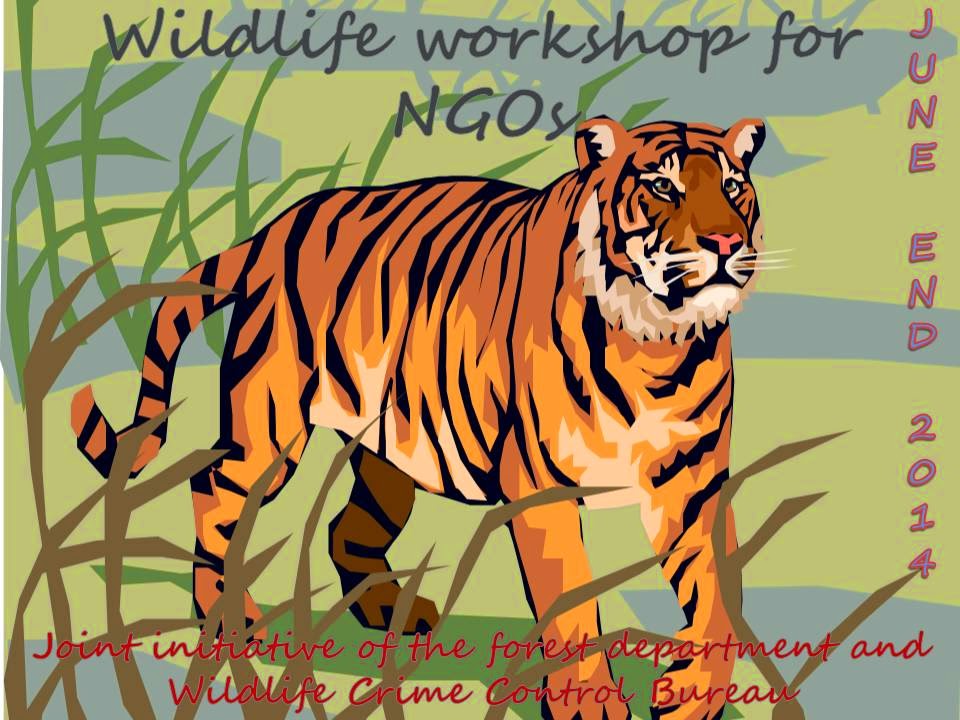Forest department and WCCB (Wildlife Crime Control
Bureau) to conduct workshop with NGOs for better wildlife management
Author: Pawan
Sharma, RAWW (Resqink Association for Wildlife Welfare)
12/6/2014
In my latest meet (on 11/6/2014) with Suresh Thorat
the APCCF (Additional Principal Chief Conservator of Forests), wildlife Mumbai
and M. Maranko, Regional Deputy Director (in charge) of the WCCB (Wildlife Crime Control Bureau) there was
a two hour healthy interaction and discussion after which it was decided that the wildlife workshop which was being planned since March but postponed due to elections will be conducted this month end with an intention for better management of the city wildlife with NGOs.
There are several NGOs and individuals who are active in
wildlife rescue, rehab and release activities in many suburbs of Mumbai and
Thane. But the matter of concern is the ethics and protocols which are
important to be followed but unfortunately are ignored and not known by many. The intention
of the workshop is to make the wildlife rescuers understand some important
rules and regulations that are laid down by the law of the country. As all
native wildkinds are protected under the Wildlife Protection Act 1972, and thus
are the property of the state, it is important that the concerned departments
under the MoEF (Ministry of Environment and Forests) are aware about the
happenings with the wildlife.
"As all the government and non government
individuals and organizations are working for the protection and conservation
of wildlife, things will be more effective and beneficial for our wildlife,
forest and environment if we all work hand in hand by maintaining transparency
and following all the protocols.
The coming workshop will be addressing issues like
wildlife rescue protocols, wildlife crime, co-ordination between the government
and non government organizations followed by a general group discussions where
the attendees will be allowed to share and express their problems while working
for wildlife and the forest department and WCCB will provide and introduce
necessary solutions" said Suresh Thorat, APCCF (Additional Principal Chief
Conservator of Forests) wildlife Mumbai.
The workshop will be a joint initiative of the forest
department and WCCB for the wildlife rescuing organizations in
the city so that wildlife management becomes easier and better. The information
and awareness from this workshop will help in deleting some of the detected
problems in the field of wildlife rescue, rehab and release. The issue of
wildlife crime and ways to help in its control will also be discussed in great details
so that the organizations and active citizens be a participant in wildlife
protection.
"Wildlife crime includes illegal custody, hunting
and poaching of wildlife or its products/articles. All these activities are not
allowed by the law of the country and a control over such activities is very
important part of wildlife conservation. We will be sharing and spreading
information and awareness on this issue to the attendees" said M. Maranko,
Regional Deputy Director (in charge) of the WCCB (Wildlife Crime Control Bureau
(Western Region) who will be highlighting on wildlife crime and the issues surrounding it.
Thane SPCA (Society for the Prevention of Cruelty to
Animals) is one of the leading organizations which has been actively into
wildlife rescue. TSPCA has many times extended support to the forest department
with rescue, treatment, rehab and release of wildlife, many rescued and injured
wildlife are treated at the hospital and later released back to wild. All the
work done by TSPCA is approved by the forest department as the ideal way of
rescuing wildlife legally as per the minutes of meeting which was conducted in March this year.
"A wildlife rescue is complete only when all the
legal formalities are followed and performed from time to time which involves
things like intimating the forest department and maintaining its paperwork, attestation of the paperwork by the concerned wildlife officer, release of species in presence of the concerned forest officials. The
intention of the workshop is to motivate legal and transparent wildlife rescue
activities, we will be sharing all the procedure we follow with each wildlife
rescue as it has been approved by the forest department thus making it
available for all the attendees so that it will help them in conducting ethical and legal wildlife rescues in future" said Shakuntala
Majumdar, President of TSPCA Who will be addressing the topic of wildlife
rescue and protocols to be followed while performing it.
Registered organizations which work for wildlife will be attending the workshop along with the
forest department and WCCB officials. Important numbers of the forest officials
will also be shared in this meet which is scheduled in the month end at SGNP (Sanjay Gandhi National Park).
Some other important topics like the short of space for
rescued wildlife and the need of space for them will also be discussed in details.
Wildlife rescuing organizations face many problems when they require the
support of police in case of wildlife distress or any illegal wildlife act, as many
times the cops do not know what role are they supposed to play. The forest
department and WCCB is also planning for a governmental workshop for the cops
where they will be made aware of the duties they are supposed to perform and
powers that they are enforced with during wildlife distress or illegal cases
being reported.
Such kind of support and motivation from the forest
department towards young organizations like ours is setting a very positive
example in the society. It was initially assumed that government and non
government organizations can not fit in the same room but we are proud to be
participant and contributor in the evolution of the changing trends.




